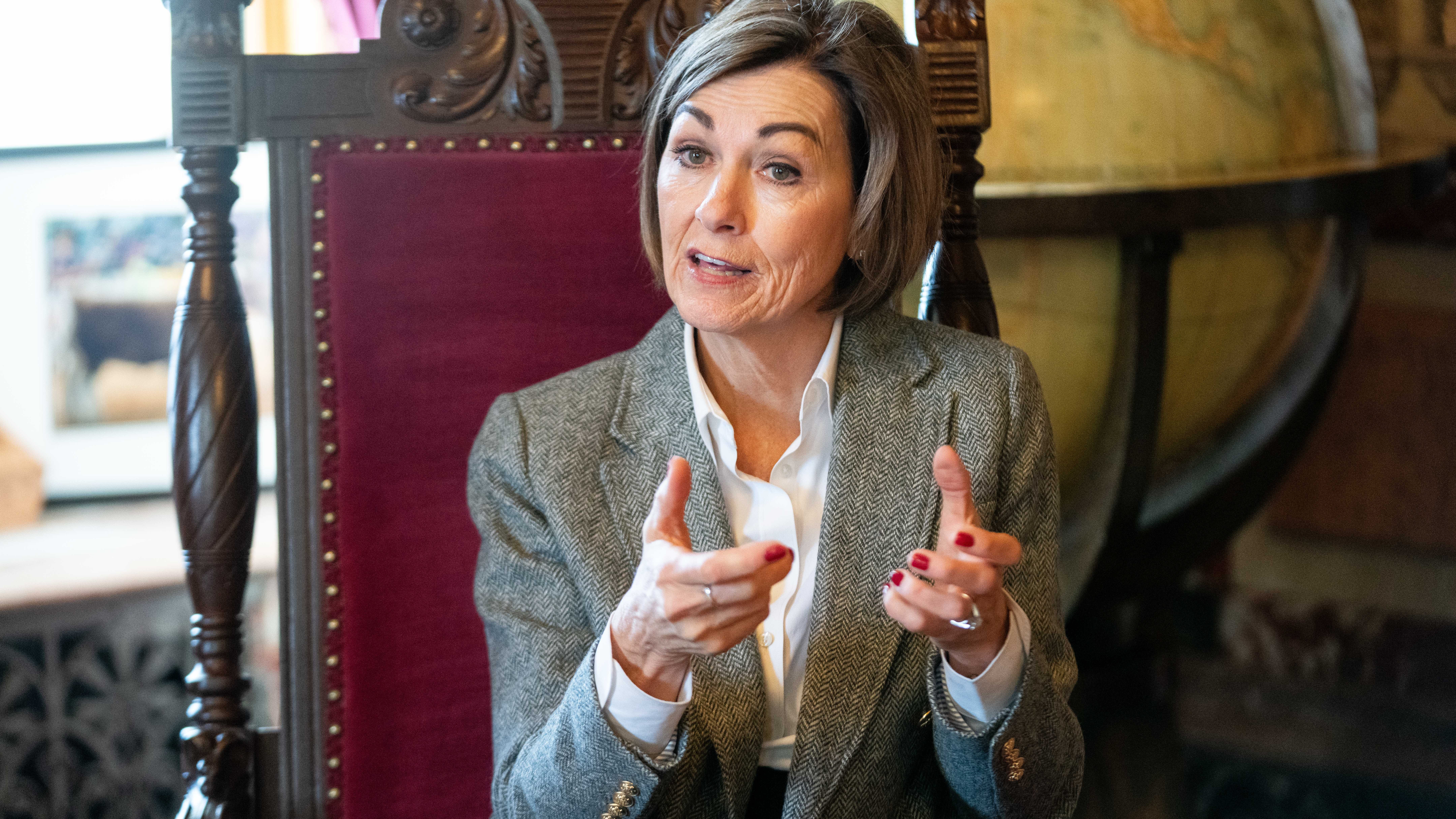
Watch: Gov. Kim Reynolds discuses task force for Iowa ‘DOGE’
Hear from Gov. Kim Reynolds as she talks about Iowa’s ‘DOGE’ on Thursday, Jan. 16, 2025, at the Iowa State Capitol.
- Iowa’s DOGE task force is considering issuing a recommendation to consolidate the state’s 99 counties to improve government efficiency and enable property tax cuts.
- The task force argues that the current county structure is outdated and wastes resources, citing Iowa’s low population density.
- The task force is focusing on streamlining services and regionalization rather than directly addressing property tax reform.
Iowa’s government efficiency task force is exploring whether to recommend consolidating the state’s 99 counties as a way to drastically rein in local government spending and grease the wheel for lawmakers to make property tax cuts.
Members of the Iowa DOGE task force, which follows in the footsteps of President Donald Trump’s federal Department of Government Efficiency, raised the possibility at the group’s Wednesday, June 4, meeting in Des Moines.
It was the panel’s second meeting since Gov. Kim Reynolds in February signed an executive order creating it.
Terry Lutz of McClure Engineering, who is on a group within the task force focused on maximizing return on taxpayer investment, said Iowa ranks near the bottom of all states with the least number of people represented by “thousands of locally elected officials and thousands of people required to work with outdated systems.”
When Iowa became a state in 1846, Lutz said creating 99 counties was the most efficient way to provide government services. Iowans drove horses and buggies to their courthouses and back home in one day.
“This outdated structure may make us feel better politically, but we are wasting valuable resources, and it is costing us millions,” Lutz said. “We don’t need bigger buggy whips to go faster. We need to embrace technology to gain efficiency.”
There are several regional shared service delivery systems already in place, including judicial districts, highway patrol districts and behavioral health districts. He said the state could pursue more opportunities to deliver services across broader regions given its small population.
Andrea Woodard, executive director of the Iowa State Association of Counties, said Iowa’s been a home-rule state since 1978, giving cities and counties broad authority over their own local affairs.
“We support local control,” Woodard said. “We think it’s important and we think that counties are lean and efficient and continue to find efficiencies within and across county lines.”
Iowa DOGE is floating the idea as many of Iowa’s most rural counties shrink.
Iowa’s population grew 4.7% from 2010 to 2020, but 68 of 99 counties lost population, according to 2020 census data.
Iowa DOGE task force chair Emily Schmitt, chief administrative officer and general counsel of Sukup Manufacturing, told reporters this idea was submitted as the panel solicited feedback from Iowans.
“Some of the ideas that are in the gathering phase may not make it to the recommendation phase, so we really find out in the research one (phase) really, what are the recommendations that should be moved forward, and what are those that are practical and ready that we’re able to do?” Schmitt said.
Schmitt said it’s too soon to say whether or not this may lead to more shared services among regions if the pitch to consolidate counties doesn’t advance.
“What I do know is that we are looking at streamlining any way we can,” Schmitt said.
How would consolidating Iowa’s 99 counties work?
If DOGE moves forward with making this recommendation official, there would still be several more steps to bring county consolidation plans to fruition.
Two consecutive general assemblies would have to pass legislation to amend the state constitution. A simple majority of Iowa voters would then have to approve the measure in a general election.
County governments handle various functions including law enforcement, tax collection, maintaining records and administering elections.
Some counties already are splitting costs by combining auditor and recorder positions or regionalizing electronic services, Woodard said.
If Iowa counties consolidate and there are fewer in-person facilities, she said expanding online services could be an option, but it’s important that service access remains part of the conversation.
“Each service that is provided would need to be handled differently,” Woodard said. “Adams County’s needs are very different than Polk County’s needs, so how do you ensure that services are being provided for Iowans at the same level or an equal playing field across the state?”
Lutz said his DOGE group also sees more opportunities to share administrative services between school districts as rural populations decline and “school district consolidation is inevitable.” He said it’s such a massive issue that educators and lawmakers should address it outside of DOGE’s work.
Iowa DOGE won’t address property tax system
Lutz called property taxes the “elephant in the room” and said Iowa DOGE doesn’t plan to address the complicated property tax system but is looking for ways to reduce taxes without shifting the cost to other taxes and fees.
The Legislature adjourned the 2025 legislative session in May without taking action to lower property taxes, which Republicans had described as their top priority for the year.
The GOP chairs of the House and Senate Ways and Means Committees unveiled multiple versions of their proposal to reshape the property tax system by shifting school funding to the state’s general fund and eliminating the decades-old “rollback” mechanism while giving homeowners a greater tax exemption on the value of their home.
But Rep. Bobby Kaufmann, R-Wilton, who chairs the House’s tax-writing committee, said the solution “is not as simple as we’ll just go fix it.”
The dramatic rise in property assessments Iowa has seen in recent years is “not sustainable,” Lutz said.
Without wading into the property tax system, the DOGE workgroup is focused on regionalizing to promote sharing government services, improving education, aligning government employee compensation and benefits with the private sector and streamlining the public infrastructure construction process.
“We’re looking for ways to get the Iowa taxpayers more for their money,” Lutz said. “We do not intend to nibble around the edges.”
In a May 23 episode of “Iowa Press” on Iowa PBS, Reynolds said she would use the time leading up to the 2026 legislative session to work on property tax legislation and get feedback from Iowans and local governments.
“We have to think differently about how we deliver services to our citizens,” Reynolds said. “We can’t continue to have the level of government that we have and expect the property taxes to go lower. It’s just not feasible. The math doesn’t work. And so, everything needs to be on the table.”
What’s next for Iowa DOGE?
Schmitt said task force members will evaluate which ideas have the potential to become final recommendations and then do more research on those items.
Iowa DOGE next meets Aug. 6. The panel isn’t slated to issue its final recommendations until September.
Marissa Payne covers the Iowa Statehouse and politics for the Register. Reach her by email at mjpayne@registermedia.com. Follow her on X, formerly known as Twitter, at @marissajpayne.
This story was updated to add a gallery.



